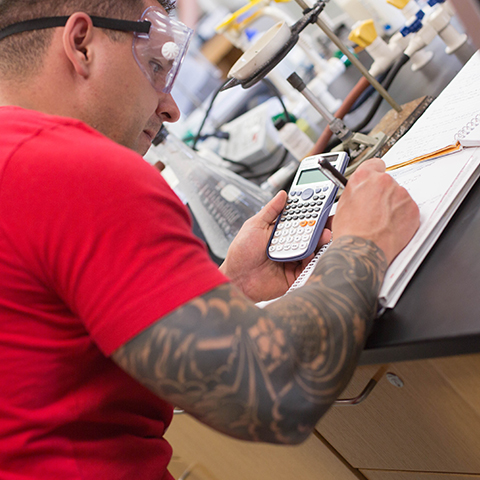Why study American Chemical Society Certified at APSU?
APSU is a great place for chemistry majors for a variety of reasons. The department boasts a high placement rate for graduates into professional schools and employment opportunities. Our low student to faculty ratio enables students to have close interactions with their instructors. All of our classes (both lectures and labs) are taught by professors who get to know each and every student on a first-name basis. All instruction takes place in state-of–the–art lecture and laboratory facilities. Undergraduate research within the department is growing and there are opportunities to receive funding to conduct this research with a faculty mentor in a variety of chemical fields.
What will I learn?
Chemistry is often called the “central science” due to the fundamental role it plays in every aspect of the world around us. A student majoring in chemistry has a deep commitment to understanding how our world exists and operates on a molecular level in accordance with the laws of nature. Chemistry is a very rigorous curriculum that involves physics and mathematics to help students understand the driving forces of the chemical reaction. There are many branches of chemistry and students often gravitate to specific fields like organic, inorganic, physical, biochemistry, or materials chemistry.
The Freshmen Seminar degree requirement completed by most students is UNIV 1000. The course is delivered in a small-class setting with like-minded students led by a faculty member and a peer leader. The interdisciplinary course is intended to support first-semester students and provide them with a foundation for university success. Emphasis is placed on student engagement, university learning success strategies, support services, library literacy, financial literacy, and academic and career planning. The first class meeting of UNIV 1000 during fall semesters is on Freshmen Convocation Day.
The general education core is designed to develop critical competencies in written communication, oral communication, mathematical analysis, and critical thinking skills. Students at APSU select coursework in the general education core in the areas of Communication, Humanities and Fine Arts, Social and Behavioral Sciences, History, Natural Sciences, and Mathematics. While the general education core requirements for graduation can be met by choosing courses from each of these areas, some programs of study require lower division courses that serve as prerequisites for upper division courses. Students should consult the sample 4-year plans and confer with their academic advisors as they choose their general education core courses.
What engagement opportunities are available to APSU students?
APSU fosters a positive campus environment that encourages active participation in university life. Organizations and honor societies in which students can engage are …………..coming soon
APSU students engage in HIP curricular and co-curricular experiences that advance their learning and knowledge. Opportunities include first-year seminar, first-year learning communities, common reading experience 'The Peay Read', undergraduate research, study abroad, service and community-based learning, internships, e-portfolio development, and capstone courses & projects.
What Do Chemistry Majors Do After Graduation?
Chemistry majors have a variety of options available to them after graduation because of the analytical and critical thinking skills learned while they are a student at APSU. Many enter professional schools (graduate, medical, pharmacy, dental, dental hygiene) while others directly enter the workforce for public employers or governmental agencies as technicians, quality control scientists, researchers, forensic scientists, process control operators, and middle school or high school teachers.
- Many enter professional schools (graduate, medical, pharmacy, dental, dental hygiene) while others directly enter the workforce for
- Public employers technicians
- Governmental agencies as technicians
- Quality control scientists
- Researchers
- Forensic scientists
- Process control operators
- Middle school
- High school teachers
